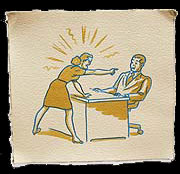A regular participant in the comment section of Mormon Coffee recently took issue with some of the moderating that takes place here. She wrote,
i realize you try your best to control the tone on this site-as one-sided as it may be. that is completely your prerogative, obviously.
with that said, don’t be surprised at the response you get to your queries and accusations—it is merely the fruit of the tree you planted.
so bleep what people say, sure…but please don’t be surprised that you fostered such a reaction to begin with. if you desire a cute little club that mormon-haters can join, log in, and chat it up with all their other mormon-hating friends..then do that…but don’t allow us to post under false pretense that we are moderated under the same rules as the true “Christians”–then bleep what we say like we’re a bunch of swearing inbreds. just a thought 🙂
I’d like to try to clarify the part of our Comment Policy that results in the moderators “bleeping” some statements.
 Editors and commenters alike at Mormon Coffee do ask hard questions. Obviously, the doctrinal convictions of the blog posters from MRM are at odds with those of our Mormon visitors. We invite people on all sides of any given issue to argue their convictions. We encourage that discourse. This is the “fruit” we hope to see from the tree we’ve planted.
Editors and commenters alike at Mormon Coffee do ask hard questions. Obviously, the doctrinal convictions of the blog posters from MRM are at odds with those of our Mormon visitors. We invite people on all sides of any given issue to argue their convictions. We encourage that discourse. This is the “fruit” we hope to see from the tree we’ve planted.
What we do not want to see — and what we moderate against — is disrespectful comments about the people who post and comment here, rather than discussion of the issues. These are the remarks that get “bleeped.”
Consider these two fictional examples of comments:
- “I disagree with your conclusion. I don’t think it makes any sense, and here’s why.”
This is a criticism directed at an argument; it is welcome on Mormon Coffee.
- “Jason, you are an idiot. You only talk about this because you hate Mormons. You should be ashamed of yourself.”
This is a criticism directed at a person; it is not part of a respectful dialog.
Christian author and speaker Greg Koukl has pointed out,
“The minute one is labeled mean-spirited simply for raising an opposing view, it cuts off debate. This simply isn’t fair. We avoid what may be a legitimate discussion by simply calling names. Worse, we compromise our ability to know the truth.
“It’s absolutely imperative that we not silence dissent in this way. We ought to learn how to argue fairly, reasonably, and graciously. We need to cultivate the ability to disagree with civility and not take opposition personally. We also must have the grace to allow our own views to be challenged with evidence, reasoning, and Scripture. Those who refuse to dispute have a very poor chance of growing in truth.”
 That is one goal of conversation over Mormon Coffee — that we disagree (if we must) with civility. In order to foster an environment of courteous (safe) discourse, the moderators “bleep” personal criticisms directed at others who participate on the blog.
That is one goal of conversation over Mormon Coffee — that we disagree (if we must) with civility. In order to foster an environment of courteous (safe) discourse, the moderators “bleep” personal criticisms directed at others who participate on the blog.
Greg Koukl gives sound advice for an appropriate way to deal with challenges to our faith. I leave you with his counsel:
“Read critically. Reflect on the claims. Check the background information. Assess the argument. Find the truth. That’s the habit of clear-thinking [people].”
